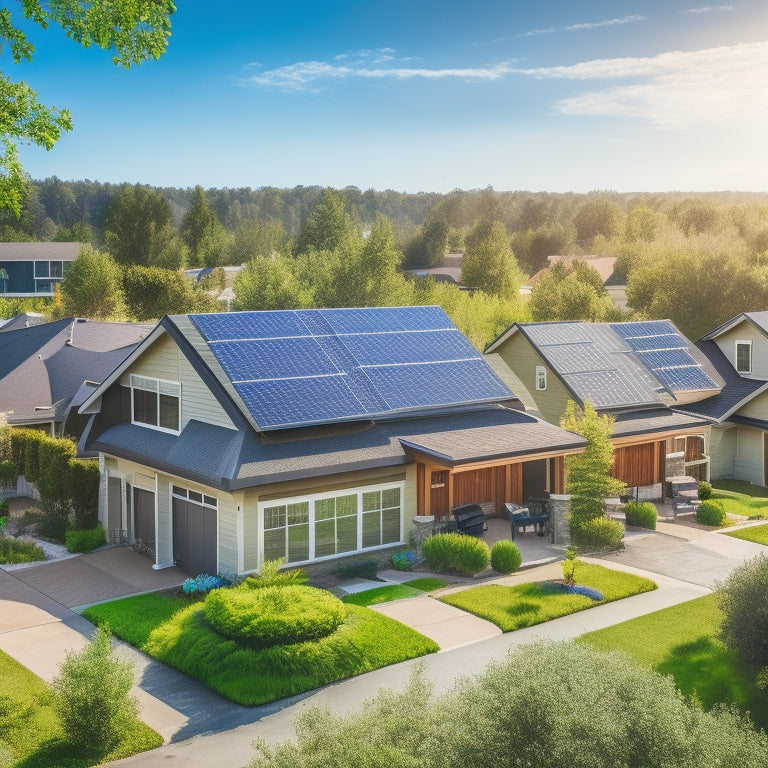
Top-Rated Home Solar Panels: 5 Essential Tips
Share
When shopping for top-rated home solar panels, you'll want to take into account more than just brand reputation. Look for panels with high efficiency ratings, thorough warranties, and genuine customer reviews that provide valuable insights into performance. Don't forget to assess the manufacturer's experience, expertise, and commitment to quality. By weighing these factors, you'll be able to find a reliable system that meets your energy needs. Now that you know what to look for, dig deeper to uncover the best solar panels for your home and start generating clean energy and long-term savings.
Key Takeaways
• Research top solar panel brands considering efficiency, warranty, and customer reviews to ensure a reliable and high-quality system.
• Evaluate a brand's experience, industry certifications, and manufacturing process to guarantee a durable and efficient system.
• Read authentic customer reviews to gain insights into a product's performance, looking for specific examples and experiences.
• Assess a manufacturer's warranty and support, seeking extensive coverage and timely responsiveness for a hassle-free ownership experience.
• Calculate the total cost of ownership, considering upfront costs, long-term savings, and incentives to find the best value for your money.
Researching Top Solar Panel Brands
When choosing a solar panel brand, you'll want to narrow down your options to the top manufacturers, considering factors such as efficiency, warranty, and customer reviews. A significant brand reputation is important, as it directly impacts the quality of your solar panels. Look for brands with a proven track record of delivering high-quality products and exceptional customer service.
Industry certifications, such as those from the International Electrotechnical Commission (IEC) and Underwriters Laboratories (UL), are essential in ensuring the brand meets international standards for safety and performance.
You should also research the brand's experience and expertise in the solar industry. Check if they've any notable awards or recognition from reputable organizations. Additionally, read customer reviews and ratings from independent review platforms to get a sense of the brand's customer satisfaction levels.
Understanding Efficiency and Durability
When evaluating solar panels, it is important to take into account two critical factors: efficiency and durability, as they directly impact the performance and lifespan of your solar panel system. Efficiency refers to the panel's ability to convert sunlight into electricity, while durability guarantees the panel can withstand various environmental conditions.
Here's a comparison of key factors affecting efficiency and durability:
| Factor | Impact on Efficiency and Durability |
| Temperature Resistance | High temperatures reduce efficiency by 0.4-0.5% per °C. Look for panels with high temperature resistance for peak performance. |
| Panel Degradation | Degradation rates vary among manufacturers. Look for panels with low degradation rates for long-term performance. |
| Materials Quality | High-quality materials ensure sturdiness and longevity. Check the warranty and material specifications. |
| Manufacturing Process | A dependable manufacturing process ensures consistency and quality. Research the manufacturer's process and certifications. |
When evaluating solar panels, consider these factors to make sure you get a system that meets your energy needs. Remember, a high-efficiency panel may not be the best option if it's prone to degradation or has poor temperature resistance.
Reading Authentic Customer Reviews
You can gain valuable insights into a solar panel's performance and reliability by reading authentic customer reviews, which provide firsthand accounts of a product's strengths and weaknesses. However, it's important to verify the authenticity of these reviews to make sure they're trustworthy. Fake reviews can be misleading, and detecting them is vital.
To make sure you're reading genuine reviews, look out for the following red flags:
-
Overly positive language: Be cautious of reviews that use overly promotional language or seem too good to be true.
-
Lack of specific details: Authentic reviews usually provide specific examples or experiences. Be wary of reviews that are vague or lacking in details.
-
Unusual review patterns: Be suspicious of reviews that are posted in bulk or have an unusual rating pattern.
Evaluating Warranty and Support
A thorough warranty and dedicated customer support can greatly impact your overall solar panel ownership experience, providing protection and assistance when you need it most. When evaluating warranty and support, you want to make sure that the manufacturer stands behind their product's reliability. Look for a extensive warranty that covers parts and labor for an extended period, typically 25 years or more. This will give you peace of mind knowing that you're protected against defects and malfunctions.
In addition to warranty, assess the manufacturer's service guarantees. Do they offer dedicated customer support, including online resources, phone, and email support? Are they responsive to your inquiries and concerns? A reliable manufacturer will provide transparent and timely support, ensuring that any issues are resolved quickly and efficiently.
Comparing Prices and Incentives
With multiple manufacturers and installers vying for your business, comparing prices and incentives becomes an essential step in finding the best value for your money. You'll want to contemplate not only the upfront cost of the solar panels but also the long-term savings and potential incentives.
To make an informed decision, conduct a thorough cost analysis, taking into account the following:
-
System cost: Compare prices from different manufacturers and installers to find the best deal.
-
Federal and state incentives: Research federal tax credits and state policies that can help offset the cost of your solar panel system.
-
Long-term savings: Calculate the potential savings on your energy bills over time, contemplating factors like your current energy usage and local electricity rates.
Frequently Asked Questions
Can I Install Solar Panels on My Apartment Building's Roof?
You'll need to check your apartment building's rooftop regulations and obtain neighbor approval before installing solar panels, ensuring you comply with local laws and avoid potential disputes with neighbors or building management.
Will Solar Panels Still Generate Power During a Blackout?
During a blackout, you won't get power from solar panels unless you have a battery backup system, ensuring grid reliability and power backup when the grid goes down.
Are Solar Panels Compatible With All Roof Types and Materials?
Did you know that 90% of US homes are suitable for solar panels? You'll be relieved to know that solar panels can work with most roof types and materials, considering roof angle considerations and material compatibility, ensuring a seamless installation process.
Can I Use Solar Panels to Charge My Electric Vehicle?
You can use solar panels to charge your electric vehicle, taking advantage of Vehicle Incentives and conveniently locating nearby Charging Stations, ensuring a seamless and sustainable driving experience.
Do Solar Panels Require Regular Cleaning and Maintenance?
'You'll be surprised to know that a significant 25% of solar panel efficiency is lost due to dust accumulation! Regular cleaning and maintenance are essential to guarantee peak panel performance, so don't neglect it!'
Related Posts
-

Find Your Eco-Friendly Motorcycle for a Sustainable Ride
You're shifting gears towards a more sustainable ride, opting for an eco-friendly motorcycle that combines thrill wit...
-

5 Key Components of EV Charging Infrastructure
When building an EV charging infrastructure, you'll need to focus on five key components. First, a reliable power dis...
-

Designing Efficient Vehicle Charging Infrastructure Systems
As you design efficient vehicle charging infrastructure systems, prioritize strategic planning and optimization to av...


